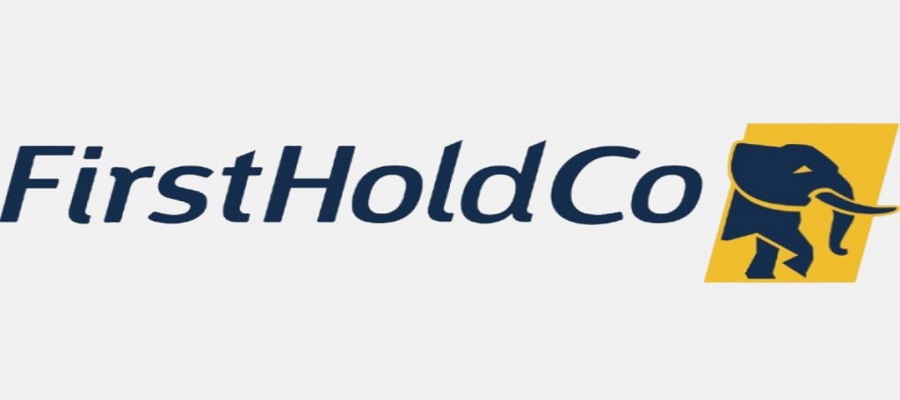E-Financial
FIRSTHOLDCO: Reinforcing ESG, Sustainability Initiatives As It Rebrands

By A.Ezekiel
In a world where approximately 20% of new businesses fail within the first two years, 45% within five years, 65% within ten years, and only 25% make it to 15 years or more (according to the US Bureau of Statistics), any business that has crossed 15 years should be sharing insights on survival and success.

But what about businesses that have lasted twice that long? Or a financial services group that has thrived for over 130 years, especially in Africa, where business survival rates are likely lower than those statistics from the Global North? Such a group has certainly earned the right to teach masterclasses on business longevity.
First HoldCo Plc (FirstHoldCo), recently rebranded from FBN Holdings Plc, exemplifies sustainable business practices. A well-diversified group, it is one of Africa’s largest financial services organisations, offering innovative financial solutions through its subsidiaries in commercial banking, asset management, capital markets, securities, trusteeship, and insurance brokerage. FirstHoldCo ensures strategic coordination and synergy among its subsidiaries to deliver long-term value for stakeholders.
Retaining the legacy strengths and experience of FBN Holdings Plc, FirstHoldCo ensures that its subsidiaries enhance positive environmental, social, and governance (ESG) impacts while minimising or eliminating negative ones. This includes managing ESG risks in the workplace, marketplace, community, and environment, with the institutional capability to turn risks into opportunities.
For example, ESG risk management enhances credit and investment decision-making, de-risking processes for subsidiaries such as FirstBank and FBNQuest. It also strengthens social relationships with the communities in which these subsidiaries operate.
ESG and sustainability may be buzzwords for some corporations seeking to appear politically correct, but at FirstHoldCo, they are integral to its identity. The company is self-driven in aligning its strategy and operations with ESG principles and setting new sustainability benchmarks for financial services in Nigeria.
FirstHoldCo’ s flagship subsidiaries, FirstBank and FBNQuest, integrate ESG risks into their products, services, and offerings from the ideation stage through to development and launch. This approach drives responsible lending and investment practices, enabling the group to leverage ESG market opportunities while promoting sustainable socio-economic growth.
FirstHoldCo also prioritises people empowerment, fostering a work environment rooted in equal opportunities, diversity, and inclusion. A notable achievement is bridging the diversity gap, reaching a 40% female to 60% male employee ratio in 2023, one year ahead of its 2024 target.
The group also supports the communities where its subsidiaries operate, ensuring its impact resonates positively. Since 2017, it has implemented the SPARK (Start Performing Acts of Random Kindness) initiative and Corporate Responsibility and Sustainability (CR&S) Week. In 2023, these initiatives impacted 60,000 lives through outreaches to 60 orphanages, 20 schools, and hospitals across Nigeria, Ghana, Senegal, The Gambia, the Democratic Republic of Congo, Sierra Leone, and the United Kingdom. Donations included consumables, computers, clean water projects, school renovations, wheelchairs, and cash. Employees committed over 27,000 volunteer hours to these initiatives.
In 2023, FirstBank reinforced its commitment to empowering women through FirstGem, a financial product supporting women-led businesses. Over N36 billion in loans were disbursed at a single-digit interest rate of 9%. Additionally, its Agency Banking business, FirstMonie, expanded its female agent network to over 55,000.
Inclusion remains a key focus, with FirstBank enhancing accessibility for physically challenged customers in 234 locations, making 25 branches fully accessible and improving access at 209 others. It also expanded the SPARK initiative to institutions like the Bethesda School of the Blind and the Down Syndrome Foundation in Lagos.
FirstBank operates an Environmental, Social, and Governance Management System (ESGMS) to drive responsible lending and minimize ESG risks. In 2023, this system was enhanced to ensure real-time transparency in corporate credit screenings. That year, 2,239 credit transactions worth N4.236 trillion were assessed for ESG risks.
To strengthen ESG compliance, FirstBank collaborates with development partners such as British International Investment, the African Development Bank, the International Finance Corporation (IFC), and Proparco, a French development finance institution. Its partnership with Proparco is crucial for integrating climate initiatives into business strategy. This project enhances its understanding of financed emissions and positions it for climate financing and investment opportunities.
This initiative will help FirstBank reduce greenhouse gas (GHG) emissions, mitigate exposure to physical and transition risks, and strengthen climate adaptation efforts. It also reinforces its market competitiveness as an ESG leader committed to a low-carbon economy.
As part of its commitment to decarbonisation, FirstHoldCo’ s FirstBank actively engages in reforestation and afforestation through partnerships focused on carbon dioxide (CO2) removal. In 2023, it pledged to plant 50,000 trees by 2025 in collaboration with the Nigerian Conservation Foundation (NCF). That year, it planted 1,000 trees at the Lekki Conservation Centre, Lagos; Model Secondary School, Maitama, Abuja; and Federal Government Girls College, Calabar. By the following year, it had planted an additional 30,000 trees, bringing the total to 31,000.
FirstBank also drives thought leadership in climate finance, promoting knowledge on carbon mitigation and climate adaptation. A notable effort was a webinar themed ‘Harnessing Climate Finance Opportunities in Nigeria,’ held in partnership with the Sustainability Practitioners Institute of Nigeria (SPIN). The event featured prominent ESG and sustainability experts such as Professor Kenneth Amaeshi, Dr. Muntaqa Umaru-Sadiq, and Carina Dunker, underscoring FirstBank’s commitment to advancing climate finance discussions.
With so much achieved and ongoing ESG/sustainability initiatives, what is the greatest impact of ESG at FirstHoldCo?
For the group, it is the net positive effect on the communities where its subsidiaries operate. For individuals, it is the tangible benefits from its financial solutions and CSR initiatives. For businesses, it is the sustainable practices FirstHoldCo champions, setting a standard for responsible corporate leadership
E-Financial
Nigerian Banks End Years of Embargo, Resume Intl Transactions on Naira Cards

Nigerian banks have resumed international transactions on naira-denominated debit cards, marking a significant shift in banking operations for customers who rely on foreign payments.

This is coming nearly three years of suspension.
United Bank for Africa (UBA) and Wema Bank, in separate communications to their customers, announced the restoration of international payment services on their naira cards.
In a notice to its customers, UBA said the reactivation of international transactions on its premium naira cards aligns with its commitment to delivering improved and seamless banking experiences.
“We are pleased to inform you that all UBA Premium Naira Cards, including Gold, Platinum, and World variants, are now enabled for international transactions,” the bank stated.
“This means you can now use your Premium Naira Card for global payments — including online shopping, POS, and ATM transactions — with ease and flexibility. If you haven’t used your card recently, now is a great time to rediscover the convenience and prestige that comes with being a UBA premium cardholder.”
Similarly, Wema Bank announced that its customers can now make dollar payments on international platforms using their naira Mastercards.
“Your Wema Naira Mastercard just went global!” the bank said. “Now you can pay in dollars on all your favourite international platforms — Amazon, eBay, AliExpress, Netflix, Spotify, YouTube.”
The development marks a major relief for Nigerian customers who have had to rely on dollar cards or alternative payment methods since most banks suspended international usage of naira cards in 2021 due to foreign exchange scarcity.
E-Financial
Flutterwave Secures 20 more US Money Transmitter Licences

Flutterwave, Africa’s leading payments technology company, today announced the relaunch of its flagship remittance solution, Send App, across U.S. states following its newly acquired Money Transmitter Licences (MTLs).

This comes after Flutterwave secured 20 additional MTLs in the U.S., adding to the 14 licenses the brand has held since 2023.
Altogether, this achievement raises Flutterwave’s total number of direct licenses to 34, allowing the company to operate across many U.S. states and territories without partners or intermediaries.
Users in the U.S. can now send money to Nigeria, Ghana and Egypt, unlocking new remittance corridors that were previously unavailable.
Alongside this expansion, the onboarding process has been streamlined with a quick ID check, making it faster and easier for new users to get started.
Additional improvements include optimised payment support for US-issued Visa and Discover cards, enhanced security measures to safeguard transactions and maintain compliance, and improved in-app flows for a simpler, more efficient sending experience.
This return also highlights Flutterwave’s commitment to delivering a seamless, secure, and regulatory-compliant user experience for all Send App customers in the U.S. Users can now send money from DC, Georgia, Maryland, North Carolina, Michigan, South Carolina, Tennessee.
Other U.S. states and territories where Send App by Flutterwave supports outward remittances include Alaska, Arizona, Arkansas, Delaware, Idaho, Illinois, Indiana, Iowa, Louisiana, Maine, Minnesota, Mississippi, and Missouri, Nebraska, New Hampshire, New Mexico, North Dakota, Oklahoma, Oregon, Puerto Rico, Rhode Island, South Dakota, Utah, Washington, West Virginia, Wisconsin, and Wyoming.
Commenting on the relaunch, Olugbenga “GB” Agboola, Flutterwave Founder and CEO, said, “By expanding our reach and enhancing our services, we are empowering millions of Africans in the U.S. to maintain strong financial ties with their home countries, support their families, and contribute to economic development across the continent. Additionally, we are staying true to our core mission of bridging Africa with the global economy and vice versa.”
Earlier this year, Flutterwave integrated Swap into Send App for seamless FX transactions and strengthened its services in Ghana by securing approval for inward remittance from the Bank of Ghana.
E-Financial
Court Affirms NIBSS Authority to Manage BVN

Federal High Court in Abuja on Friday affirmed the authority of the Nigeria Inter-Bank Settlement System (NIBSS), to manage the Bank Verification Number (BVN), database across the country, in line with the Central Bank of Nigeria (CBN), Act and other relevant banking laws.

This is according to a judgment delivered by Justice James Omotosho on Friday.
Wolemi Esan, senior advocate of Nigeria, NIBSS’s counsel, and Kofo Abdulsalam-Alada, lead counsel for the CBN, among others, had sought a restraining order to prevent any institution in Nigeria from challenging the agency’s statutory authority to maintain and manage the BVN database.
This comes as NIBSS had alleged that Digital Rights Lawyers Initiative filed multiple suits, either directly or through proxies, challenging its authority to manage the BVN database and claiming that such management violates constitutional privacy rights.
However, Justice Omotosho, delivering his judgment, said the BVN does not infringe on the constitutional right to privacy.
“The initiative does not infringe on the constitutional right to privacy but rather serves as a necessary tool for safeguarding public interest and enhancing financial security.
“NIBSS has the power to manage the BVN,” the judge said, citing relevant CBN laws.
“The court grants the reliefs of NIBSS as prayed,” he stated.

 Telecom2 days ago
Telecom2 days agoNCC Approves MTN, 9Mobile Roaming Collaboration Deal

 Telecom1 day ago
Telecom1 day agoMTN Nigeria Debuts Game-Changing CPaaS Platform at NextNow Forum

 E-Financial1 day ago
E-Financial1 day agoNAICOM Issues New Licenses to SanlamAllianz Life, General Insurance

 E-Financial2 days ago
E-Financial2 days agoWorld Bank Approves Extra $65m for Nigeria’s SPESSE

 E-Financial1 day ago
E-Financial1 day agoGTCO to Become First Nigerian Bank to List on London Stock Exchange

 News1 day ago
News1 day agoAMCON Confirms ₦100Bn Sale of Ibadan DisCo Amid Legal Disputes

 E-Business1 day ago
E-Business1 day agoDomain of Deception as Attackers Deploy Spyware Under Guise of Legal Threats

 E-Financial2 days ago
E-Financial2 days agoEcobank Taps Google Cloud to Deepen Financial Inclusion




























